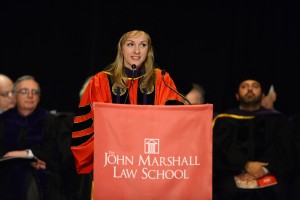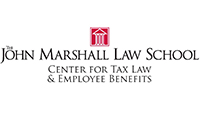(Below is the commencement address delivered May 18, 2014, by class valedictorian Elizabeth Winkowski.)
 On behalf of our class, I’d also like to thank the family, friends, mentors, and loved ones who are celebrating with us today. Thank you for being there for us. For forgiving us when we forgot to call you, and listening to us ramble on about the law when we did. You sustained us with care packages, love, and support. We would not be here without you.
On behalf of our class, I’d also like to thank the family, friends, mentors, and loved ones who are celebrating with us today. Thank you for being there for us. For forgiving us when we forgot to call you, and listening to us ramble on about the law when we did. You sustained us with care packages, love, and support. We would not be here without you.
To my fellow graduates, I would like to breathe a collective sigh of relief with you all. We’ve made it! For so long, this day seemed so far away, at times unreachable. But we’re finally here. Congratulations to us all.
Three years ago, we came together from every corner of the United States and different parts of the world. From Utah, and China, and California, and Texas. From Canada, and Russia, the North Shore, and the South Side. And yet, for three years, we’ve spent our days in a tiny geographical radius—a world that revolves around the axis of State and Jackson.
It’s not your typical law school campus. John Marshall is flanked by Garret’s Popcorn and a 24-hour Dunkin’ Donuts that is perpetually busy. By a pair of exclusive downtown clubs, the Metropolitan Correctional Center, and the Federal Courthouse. On cool, damp mornings downtown, you’ll hear the shriek of the “L” tracks and smell the lingering bus exhaust and cigarette smoke that fill the air. Late in the afternoon, reporters stand outside our doors on Plymouth Court, relaying the verdicts from trials being held in courtrooms across the street.
You won’t find a grassy quad, ivy-covered walls, or Gothic piles on our campus. But we have something far more interesting—and more important than that.
We are not closed off from the world to debate and discuss the law—but deeply connected to the city around us. For some, that means working at the Fair Housing Clinic to help a single mother secure a home in the face of discrimination. For others, it means going out into the communities and working with high school students in the Restorative Justice Program, or externing in the immigration court, or the public defender’s office. For all of us, it means seeing the bigger picture and being connected to a much wider world.
Our professors have encouraged us to make the city a part of our law school experience—to watch oral argument across the street, to participate in the bar association next door, or even to wander down to the Art Institute and let our imaginations run.
There’s something else that makes John Marshall special—and that is our connection to each other.
Marina Keegan, a gifted writer and young Yale graduate whose life was taken too soon, wrote an essay called the “Opposite of Loneliness” that so captured the feeling of being part of a close-knit place. She wrote:
“It’s not quite love and it’s not quite community; it’s just this feeling that there are people, an abundance of people, who are in this together. Who are on your team. When the check is paid and you stay at the table. When it’s 4 a.m. and no one goes to bed.”
This too is John Marshall. We have helped each other succeed—hashed out our notes and ideas in first-year study groups that have become three-year friendships, and will last much longer than that.
Wherever we go from here, whatever place we ultimately become a part of, we will always share this connection to this city and to each other. And with those big shoulders to stand on, anything is possible.
Thank you.
Elizabeth Winkowski, a Wisconsin native, received a B.A. from Boston College and an M.A. from Northwestern University. Before coming to law school, she moved to Chile for six months and taught English. She worked as an editor for McGraw-Hill and did did work in social media.
Winkowski took part in the law school’s IP summer program in China and was the lead articles editor for the Review of Intellectual Property Law. She served as a teaching assistant for Professor Maureen Collins, as well as serving as an extern in the U.S. District Court.
Elizabeth clerked throughout her law school career at Edelson P-C and accepted a position there. She will take a year off from the firm starting in January 2015, to serve as a law clerk for Judge Harry Leinenweber at the U.S. District Court.


